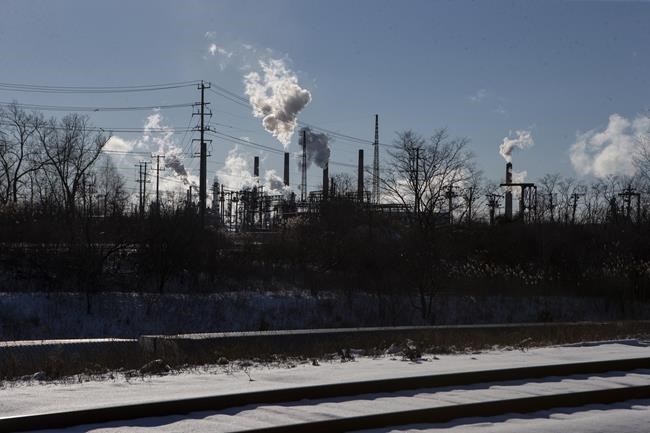OTTAWA — Feelings of hope and relief flooded Aamjiwnaang First Nation in Sarnia, Ont., on Friday after the federal government moved to enforce tougher air quality standards at a styrene plant that has been emitting dangerous levels of benzene for years.
"We're optimistic," said Cathleen O'Brien, the environmental co-ordinator for Aamjiwnaang, an Anishinaabe community in the middle of what is known as Canada's Chemical Valley.
"For many people it's been a lifetime of concern."
More than 40 per cent of Canada's chemical industry is concentrated in about a 40-square kilometre radius in and around Sarnia. From the Aamjiwnaang band office, dozens of petrochemical storage tanks and smoke stacks can be seen in almost every direction.
The order, signed Thursday by Environment Minister Steven Guilbeault, comes through the Canadian Environmental Protection Act and would affect any chemical maker in Sarnia that had levels of benzene pollution above 29 micrograms per cubic metre of air, at any time between March 1, 2023, and Feb. 29, 2024.
The only plant to exceed that level is Ineos Styrolution, a styrene maker whose factory is across the street from the Aamjiwnaang band office.
"The situation had to be corrected," Guilbeault said in an interview. "As the government of Canada, we take our responsibility to protect the health of Canadians very seriously."
The order requires the company to install vapour control systems and fully closed vent systems on benzene storage tanks.
The order is similar to regulations that Ottawa is in the midst of implementing across the board for chemical pollution, but which are not expected to take effect until at least late next year.
Guilbeault said the emergency order fast-tracks those regulations for Ineos because the fix is needed now. "The ball is in the court of the company now."
The temporary order is in place for two weeks based on Guilbeault's signature alone. The federal cabinet will debate whether to extend it for up to two years.
Benzene pollution from the Ineos Sarnia facility has been a problem for years. The Ontario Environment Ministry has issued four orders to fix benzene levels since 2019, including the most recent compliance order made in April.
On May 1, Ontario suspended Ineos's operating permit until the company shows compliance with multiple conditions including repairing leaky equipment, installing full vapour control on vessels containing benzene, and implementing a comprehensive benzene monitoring plan and community notification system.
O'Brien said the federal order complements the provincial order, even though they are very similar.
The company did not respond Friday to a request for comment. In a statement earlier this month Ineos denied it had measured any levels of benzene over its allowed limit and that it temporarily shut down to perform maintenance and address a mechanical issue.
Benzene is a clear, mostly colourless liquid that is part of the makeup of crude oil. Styrene, made from a chemical process involving benzene, is a lightweight plastic used in everything from auto parts and food containers to toys like plastic building blocks.
Ineos, a German company, began a shutdown at its Sarnia styrene plant on April 20, four days after Aamjiwnaang saw a massive spike in benzene levels from air monitors in and around the band office. The levels on April 16 peaked at 115 micrograms per cubic metre of air, as measured by a Clean Air Sarnia and Area Monitoring Network air monitor near the band office.
Over the course of 24 hours, that level of exposure would be 22 times more than what is considered safe. Around that time community members complained of dizziness, headaches and nausea and the band declared a state of emergency. The band office itself was temporarily closed.
In 2020 the provincial government launched a project to review benzene levels and other pollutants in Sarnia, and its findings, published earlier this year, said something had to be done to reduce benzene pollution, particularly around the Aamjiwnaang band office.
The International Agency for Research on Cancer declared benzene to be carcinogenic, with sufficient evidence to link it to leukemias and lymphomas.
About 1,000 people live in Aamjiwnaang.
"Every person here is affected by the loss of somebody to leukemia or another form of cancer," O'Brien said.
"It has affected many generations. Under current city planning bylaws ... you would never build a refinery 300 metres or so from where people spend eight-plus hours a day and another 400 metres from where people live. It just wouldn't happen. So it is very much like a legacy issue we're dealing with."
Some of Aamjiwnaang's recreation areas, including its baseball diamond, lie in the shadows of the Ineos storage tanks. From home plate, it's about 300 metres to the southern edge of the complex.
Tim Gray, executive director of Environmental Defence, called the federal emergency order a positive move. "The order will force these facilities to upgrade their benzene storage facilities, which will address a long-standing community demand."
Sean O’Shea, government relations and campaign specialist for Ecojustice, said there must be a long-term solution for Aamjiwnaang, and that the Ineos Styrolution plant must stay closed until the community believes it is safe to reopen.
This report by The Canadian Press was first published May 17, 2024.
Mia Rabson, The Canadian Press



